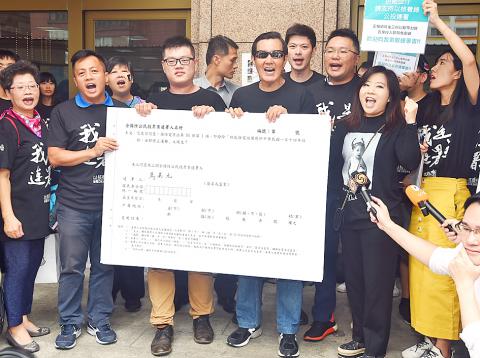A referendum proposal to scrap the “nuclear-free homeland by 2025” policy stipulated in the Electricity Act (電業法) failed to pass the legal threshold of collecting at least 281,745 signatures, the Central Election Commission said yesterday, sparking a protest by the initiators of the proposal.
The proposed referendum was initiated by Nuclear Myth Busters founder Huang Shih-hsiu (黃士修), Chunghwa Nuclear Society chairman Lee Min (李敏) and other nuclear power proponents, and garnered the support of former president Ma Ying-jeou (馬英九).
The proposed referendum would have asked whether people would agree to scrap the act’s Article 95-1, which stipulates all nuclear power facilities should be decommissioned by 2025.

Photo: Liao Chen-huei, Taipei Times
Of the 314,484 petitions gathered, only 279,419 were valid, which means the referendum proposal did not pass the legal threshold, commission data showed.
Of the 35,065 petitions said to be invalid, 12,224 are without addresses or with incorrect addresses, 9,492 were without signatures, 5,379 were repeat signatures, 3,504 were without personal identification numbers or with incorrect numbers, 1,963 contained forged information and 1,273 were incorrect or had unclear names, the data showed.
The number without signatures was the most unbelievable part, given that the initiators had checked each petition several times and would have required applicants to sign the forms if they found any that were unsigned, Lee said.
As the proposal only lacked 2,326 valid signatures to pass the threshold, the initiators would be contacting their lawyers and would demand a re-examination of the so-called invalid petitions, he said.
Among the numerous referendum proposals that might be held alongside the Nov. 24 elections, theirs is the only one that might threaten the Democratic Progressive Party (DPP) government’s core policy of phasing out nuclear power, Lee said, adding that they might initiate another referendum proposal with the 2020 presidential election if they fail this year.
The initiators had been told that the DPP would do its utmost to block their referendum proposal, said Huang, who had conducted a 140-hour hunger strike last month to protest the commission’s refusal to accept nearly 24,000 additional petitions.
Before the commission holds a meeting on Tuesday to officially announce which referendums will be conducted alongside the local elections, the pro-nuclear groups are on Sunday to stage a roadside banquet in front of the commission’s building on Xuzhou Road in Taipei to call for democracy, Huang said.

DEFENDING DEMOCRACY: Taiwan shares the same values as those that fought in WWII, and nations must unite to halt the expansion of a new authoritarian bloc, Lai said The government yesterday held a commemoration ceremony for Victory in Europe (V-E) Day, joining the rest of the world for the first time to mark the anniversary of the end of World War II in Europe. Taiwan honoring V-E Day signifies “our growing connections with the international community,” President William Lai (賴清德) said at a reception in Taipei on the 80th anniversary of V-E Day. One of the major lessons of World War II is that “authoritarianism and aggression lead only to slaughter, tragedy and greater inequality,” Lai said. Even more importantly, the war also taught people that “those who cherish peace cannot

Taiwanese Olympic badminton men’s doubles gold medalist Wang Chi-lin (王齊麟) and his new partner, Chiu Hsiang-chieh (邱相榤), clinched the men’s doubles title at the Yonex Taipei Open yesterday, becoming the second Taiwanese team to win a title in the tournament. Ranked 19th in the world, the Taiwanese duo defeated Kang Min-hyuk and Ki Dong-ju of South Korea 21-18, 21-15 in a pulsating 43-minute final to clinch their first doubles title after teaming up last year. Wang, the men’s doubles gold medalist at the 2020 and 2024 Olympics, partnered with Chiu in August last year after the retirement of his teammate Lee Yang

The Philippines yesterday criticized a “high-risk” maneuver by a Chinese vessel near the disputed Scarborough Shoal (Huangyan Island, 黃岩島) in a rare incident involving warships from the two navies. The Scarborough Shoal — a triangular chain of reefs and rocks in the contested South China Sea — has been a flash point between the countries since China seized it from the Philippines in 2012. Taiwan also claims the shoal. Monday’s encounter took place approximately 11.8 nautical miles (22km) southeast” of the Scarborough Shoal, the Philippine military said, during ongoing US-Philippine military exercises that Beijing has criticized as destabilizing. “The Chinese frigate BN 554 was

The number of births in Taiwan fell to an all-time monthly low last month, while the population declined for the 16th consecutive month, Ministry of the Interior data released on Friday showed. The number of newborns totaled 8,684, which is 704 births fewer than in March and the lowest monthly figure on record, the ministry said. That is equivalent to roughly one baby born every five minutes and an annual crude birthrate of 4.52 per 1,000 people, the ministry added. Meanwhile, 17,205 deaths were recorded, resulting in a natural population decrease of 8,521, the data showed. More people are also leaving Taiwan, with net